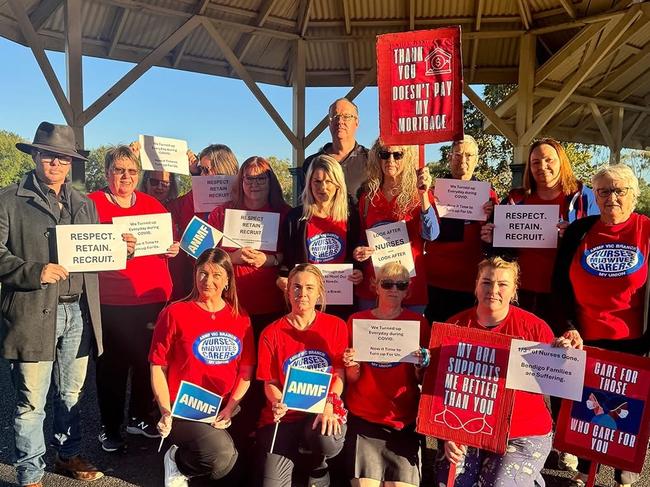Bendigo maternal and child health nurses threaten to strike as City of Greater Bendigo refuses pay deal
“Families of Bendigo are suffering” as overworked maternal and child health nurses walk off the job as Bendigo council refuses front line workers a pay rise amid heated EBA negotiations.

Bendigo
Don't miss out on the headlines from Bendigo. Followed categories will be added to My News.
Bendigo nurses who care for the most vulnerable in the community are threatening to strike as pay negotiations with the local council grind to a stalemate.
Twenty Bendigo maternal and child health and immunisation nurses started protected industrial action on Friday after the City of Greater Bendigo refused their demands amid pay negotiations.
The council refused to give the nurses a 2.5 per cent pay increase in 2026, an extra week of leave – which they are entitled to under their award – and an extra 30 minutes of paid work for administrative tasks so they can write up medical notes and referrals instead of being forced to do unpaid work through their lunch breaks or after their shifts.

The council refused their demands amid EBA negotiations with the Victorian branch of the Australian Nursing and Midwifery Federation and have instead offered a flat 10 per cent pay increase over three years without any additional benefits.
A Bendigo MCH nurse said their demands were “reasonable” and it was the “families of Bendigo that are suffering as a result” of the council’s miserly approach.
“We are some of the lowest paid maternal and child health and immunisation nurses in Central Victoria,” she said.
“Our claims are modest, but we believe they will improve morale.
“We don’t want to but we’re willing to strike if we need to.”
The nurse, who didn’t want to be named for fear of reprisal, said the Bendigo maternal and child health nursing team had recently lost 10 staff, a third of their workforce “due to stress” from their workload.

She said the staff losses had forced an 80 per cent reduction in “enhanced services” to vulnerable families in most need of support, which could impact children accessing NDIS services and other early interventions.
The nurses care for children from as young as one week and provide care for families experiencing domestic violence, drug abuse, homelessness and mental health issues.
They also offer support to new parents and others experiencing post-natal depression.
The nurse said the support they offered was essential to helping vulnerable babies and children, but they were struggling to keep up with caseloads.
“We are trying our best to improve our conditions to retain and recruit staff and continue to care for our community,” she said.
“We need to ensure the children we see are safe. If we can’t fit them in this places a huge risk on the community.”
The programs also help to reduce the caseload on emergency departments and GPs, and as MCH nurses walk their absence puts extra pressure on already overburdened health services.
“We don’t want to impact families or other services, but there would be a flow on effect because our wait times are increasing,” the nurse said.
“That would mean families would rely more on GPs, increasing wait times for everyone. “Families may also turn to emergency departments.”
Bendigo council CEO Andrew Mooney said council had approached negotiations wanting to “deliver improvements to pay and conditions”, but the City had a “responsibility” to ensure “financial sustainability”.
“The City believes it has presented a fair, reasonable and affordable offer for our staff and community,” he said.
Mr Mooney said council had refused an extra week of leave because nurses employed by the City didn’t work weekends or public holidays.
“While they deliver a valuable service, nursing in a Local Government setting is different to working in a hospital setting where there are different conditions, like an extra week’s leave, to acknowledge the type of round-the-clock care provided,” he said.
“The City’s benchmarking would indicate that our nurse pay rates are comparable to those across Local Government in the region.
“We do not anticipate that the action will impact service delivery at this time.”





